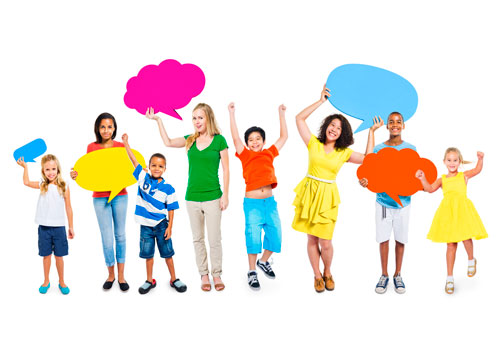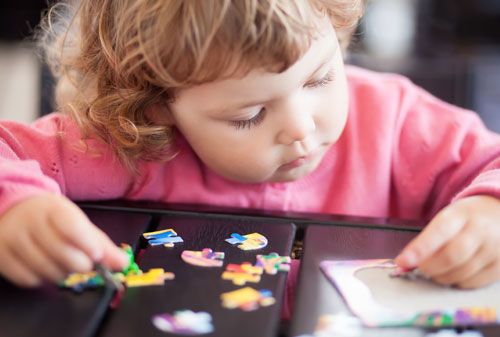




Drag the patterns of growth and development to the correct age.
Llusgwch y patrymau twf a datblygiad at yr oedran cywir.
Warning! This resource is not optimised for use on mobile devices.
Rhybudd! Ni ellir defnyddio’r adnodd yma ar ffonau symudol neu dabled.
Well done. You have matched them all correctly.
Da iawn. Rydych wedi paru pob un yn gywir.
Terms Termau |
Definitions Diffiniadau |
Correct answers Atebion cywir |
|---|

Children develop language skills at a very rapid rate between the ages of 0 – 5.
Language can be split into two sections; non-verbal and verbal communication. When a child is born it can communicate its needs through crying and facial expressions. This usually applies to the first 12 months of life.
The ability to understand language usually happens before the ability to communicate. Children start to communicate verbally through babbling and then through using one or two words. This then turns into stringing two words together, and then three, and then whole sentences.
Adults help babies and children develop language by talking to them in a particular way and by repeating the same words and phrases repeatedly.
Once a child is two they have a vocabulary of a few hundred words, this will increase rapidly. The rate of vocabulary development is influenced by how much speech they are exposed to. The more an adult talks to a child, the faster their vocabulary will develop.
By six, a child has a vocabulary of over 10,000 words. By eight a child will be able to hold adult-like conversations.
Once the basics have been learned language and vocabulary continue to develop through the life stages.
Mae plant yn meithrin sgiliau iaith yn gyflym iawn rhwng 0 a 5 oed.
Gall iaith gael ei rhannu'n ddwy ran; cyfathrebu dieiriau a chyfathrebu geiriol. Pan fydd plentyn yn cael ei eni gall gyfleu ei anghenion drwy grïo a mynegiant wyneb. Mae hyn fel arfer yn gymwys i 12 mis cyntaf ei fywyd.
Mae'r gallu i ddeall iaith fel arfer yn digwydd cyn y gallu i gyfathrebu. Bydd plant yn dechrau cyfathrebu ar lafar drwy barablu ac yna drwy ddefnyddio un neu ddau air. Yna eir ati i gysylltu dau air, yna tri, ac yna frawddegau cyfan.
Bydd oedolion yn helpu babanod a phlant i feithrin iaith drwy siarad â nhw mewn ffordd benodol a thrwy ailadrodd yr un geiriau neu ymadroddion.
Pan fydd plentyn yn ddwy bydd ganddo ychydig gannoedd o eiriau, a fydd yn cynyddu'n gyflym. Mae cyflymder datblygu geirfa yn dibynnu ar faint o leferydd mae'n cael ei amlygu iddo. Gorau po fwyaf mae oedolyn yn siarad â phlentyn.
Yn chwech oed, bydd gan blentyn dros 10,000 o eiriau. Erbyn wyth oed, bydd plentyn yn gallu cynnal sgyrsiau o fath oedolyn.
Unwaith y caiff yr hanfodion eu dysgu bydd iaith a geirfa yn parhau i ddatblygu drwy gydol y camau mewn bywyd.

Mental capacity is about how we use our minds and organise thinking to understand the world around us.
This is also called cognitive development and depends upon the child’s own pattern of development, the opportunity for playing with toys and games and experiences of activities and events.
These skills are usually gained during childhood and develop through the life stages through education, work and life experiences.
Mae a wnelo galluedd meddyliol â'r ffordd rydym yn defnyddio'r meddwl ac yn rhoi trefn ar ein meddyliau er mwyn deall y byd o'n cwmpas.
Gelwir hyn yn ddatblygiad gwybyddol hefyd ac mae'n dibynnu ar batrwm datblygu'r plentyn ei hun, y cyfle i chwarae gyda theganau a gemau a phrofi gweithgareddau a digwyddiadau.
Fel rheol, caiff y sgiliau hyn eu meithrin yn ystod plentyndod a byddant yn datblygu drwy gydol bywyd drwy addysg, gwaith a phrofiadau bywyd.
They learn more quickly if they are in a safe, nurturing environment.
Play is one of the main ways in which children learn. Children often become very absorbed in what they are doing and this helps them develop the ability to concentrate.
There are a number of play activities that children can be introduced to which will help them learn different skills. These can include:
Problem solving skills can be developed by allowing children to try to work things out for themselves and through encouraging creative play. Children should be allowed to experience failure and also see that adults sometimes need help to solve a problem.
Children need to learn how to distinguish between right and wrong and how to make good choices. In order for this to happen they need to be surrounded by good role models.
Babies cannot understand the difference between right and wrong, they are governed by their feelings and needs.
Toddlers will follow the rules to avoid punishment but they don’t yet understand right and wrong. They don’t understand why biting is wrong, but they know that they will be punished for doing it.
By the age of five a child will understand that actions have consequences, and they are aware of the rules of the family. It is during this stage of a child’s development that discipline needs to be consistent and children understand why they are being punished. It is also important that good role models surround the child.
Primary school children will now have a strong sense of right and wrong, but they will still break the rules from time to time. It is important that they feel that they are being treated fairly.
Teenagers will want to be valued by their friends so they may start to change their moral values in order to fit in with the group, which can cause problems at home. Teens like to negotiate rules so that they feel that they have more control over the decisions they make. By this age, they will be well aware of the impact their decisions can have on others.
Maent yn dysgu'n fwy cyflym os ydynt mewn amgylchedd diogel a gofalgar.
Chwarae yw un o'r prif ffyrdd mae plant yn dysgu. Bydd plant yn aml yn ymgolli'n llwyr yn yr hyn maent yn ei wneud sy'n eu helpu i ddatblygu'r gallu i ganolbwyntio.
Mae nifer o weithgareddau chwarae y gall plant gael eu cyflwyno iddynt a fydd yn eu helpu i ddysgu sgiliau gwahanol. Gall y rhain gynnwys y canlynol:
Gall sgiliau datrys problemau gael eu meithrin drwy adael i'r plant roi cynnig ar weithio pethau allan eu hunain a thrwy annog chwarae creadigol. Dylid gadael i blant brofi sut beth yw methu a hefyd weld bod angen i oedolion gael help i ddatrys problem weithiau.
Mae angen i blant ddysgu sut i wahaniaethu rhwng da a drwg a sut i wneud dewisiadau da. Er mwyn i hyn ddigwydd mae angen iddynt weld esiampl dda yn cael ei gosod o'u cwmpas.
Ni all babanod ddeall y gwahaniaeth rhwng da a drwg. Maent yn cael eu rheoli gan eu teimladau a'u hanghenion.
Bydd plant bach yn dilyn y rheolau er mwyn osgoi cael eu cosbi ond nid ydynt yn deall da a drwg eto. Nid ydynt yn deall pam mae cnoi yn anghywir, ond maent yn gwybod y byddant yn cael eu cosbi am hynny.
Erbyn bod plentyn yn bump oed bydd yn deall bod gan weithredoedd ganlyniadau, ac maent yn ymwybodol o reolau'r teulu. Ar y cam hwn yn natblygiad plentyn y mae angen i ddisgyblaeth fod yn gyson ac mae angen i blant ddeall pam maent yn cael eu cosbi. Mae hefyd yn bwysig bod plant yn gweld esiampl dda yn cael ei gosod o'u cwmpas.
Bellach bydd gan blant cynradd ymdeimlad cryf o'r hyn sy'n dda ac yn ddrwg, ond byddant yn dal i dorri'r rheolau o bryd i'w gilydd. Mae'n bwysig eu bod yn teimlo eu bod yn cael eu trin yn deg.
Bydd plant yn eu harddegau am gael eu gwerthfawrogi gan eu ffrindiau felly efallai y byddant yn dechrau newid eu gwerthoedd moesol er mwyn ffitio i mewn, a all achosi problemau gartref. Mae plant yn eu harddegau yn hoffi negodi rheolau fel eu bod yn teimlo bod ganddynt fwy o reolaeth dros y penderfyniadau maent yn eu gwneud. Erbyn yr oedran hwn, byddant yn llwyr ymwybodol o effaith bosibl eu penderfyniadau ar eraill.
Do some Internet research in order to answer the following questions.
Gwnewch rywfaint o ymchwil ar y we er mwyn ateb y cwestiynau canlynol.